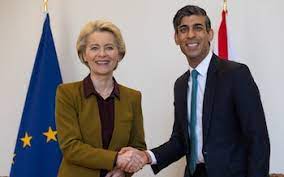Lord Howard
Last week’s brutal shooting of Detective Chief Inspector John Caldwell was a stark reminder that peace in Northern Ireland is fragile. The province is not a happy place. The power-sharing executive, the chief achievement of the Good Friday Agreement, is not in operation. The agreement is not working. And this is happening at a time when political leadership in the province has never been more necessary.
Hospital waiting lists are at an all-time high, and the legacy of Covid on the economy and public finances remains a formidable challenge. These difficulties have been exacerbated, and to a large extent caused, by the Northern Ireland Protocol. Agreed by Boris Johnson at the end of 2019, it was arguably part of the price that had to be paid to get a Brexit deal. And it is certainly the case that many of the difficulties it has caused could have been avoided if the European Union had shown a modicum of flexibility in its interpretation. But by leaving Northern Ireland in the EU’s single market, though creating some opportunities for business in the province, it has led to many obstacles for others.
The EU’s insistence on burdensome checks on goods sent from Great Britain to the province has led to difficulties for more than two-thirds of consumers there because so many retailers on the mainland no longer deliver to the province. And if the protocol were to be fully implemented, all agri-foods moving to Northern Ireland would face full EU third country checks including separate vet signed official certification – despite the fact that well over half the agri-food movements from Great Britain to Northern Ireland are intended for sale in Northern Ireland and do not enter the EU’s single market via the Republic.
There are constitutional issues, too. It is difficult for those of us who voted for Brexit so we could control our own affairs to have to accept, as the protocol provides, that in one part of the United Kingdom the European Union would continue to set rates on VAT and decide the rules governing state aid. These difficulties can’t be ignored, and successive governments have recognised the need to fix them. All have accepted that the best, and probably the only, way to fix them would be through an agreement with the EU. The Northern Ireland Protocol Bill, which in theory would give us the right to change the protocol unilaterally, was only ever intended and justified as a bargaining chip in these negotiations.
And if it were ever used, it would almost certainly have left us vulnerable to challenge from the EU for breaking the agreement and even liable to pay compensation for this breach. If agreement is reached to fix the problems caused by the protocol it would no longer be necessary. But can such an agreement be reached? Previous attempts at a negotiated outcome have failed. Now we are told that agreement is close.
The Prime Minister was right to take up the challenge and try to fix this seemingly intractable problem. As I write, the details of the deal he is close to finalising have yet to be published, but reports indicate that it will include red and green lanes for customs. Trusted traders sending goods from Great Britain to Northern Ireland will not be subject to checks, while goods destined for the Republic will go through the red lane. And Westminster will set VAT rates and state aid rules, not Brussels. If these reports are true, this would go a very long way to easing the practical difficulties that currently exist.
Of course any negotiation necessarily involves compromise, and one possible issue may relate to any continuing role for the European Court of Justice (ECJ). This should certainly be limited to any necessary interpretation of European law, but it should be remembered that the Northern Ireland Protocol Bill itself contains a clause enabling regulations to be made that would provide such a role for the ECJ. It would of course be highly desirable if the Democratic Unionist Party were to give the agreement its support. But it cannot be given a veto.
The Government of the United Kingdom must govern in the interests of the United Kingdom as a whole, and Members of Parliament at Westminster must reach their decisions on the same basis. If the agreement contains the provisions I have summarised, it will ease the problems causing so much frustration in Northern Ireland, remove one of the main obstacles to an improved relationship with the EU and help to make Brexit the success we all want it to be. Like the Prime Minister, I voted and campaigned for Brexit and am a Unionist. An agreement with these provisions will certainly have my support – and deserves the support of all Conservatives.
The Telegraph







